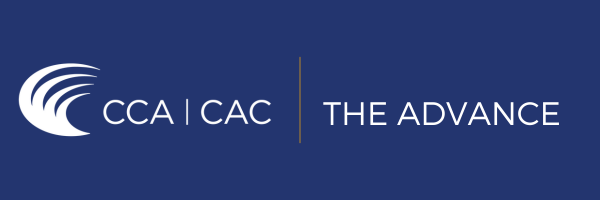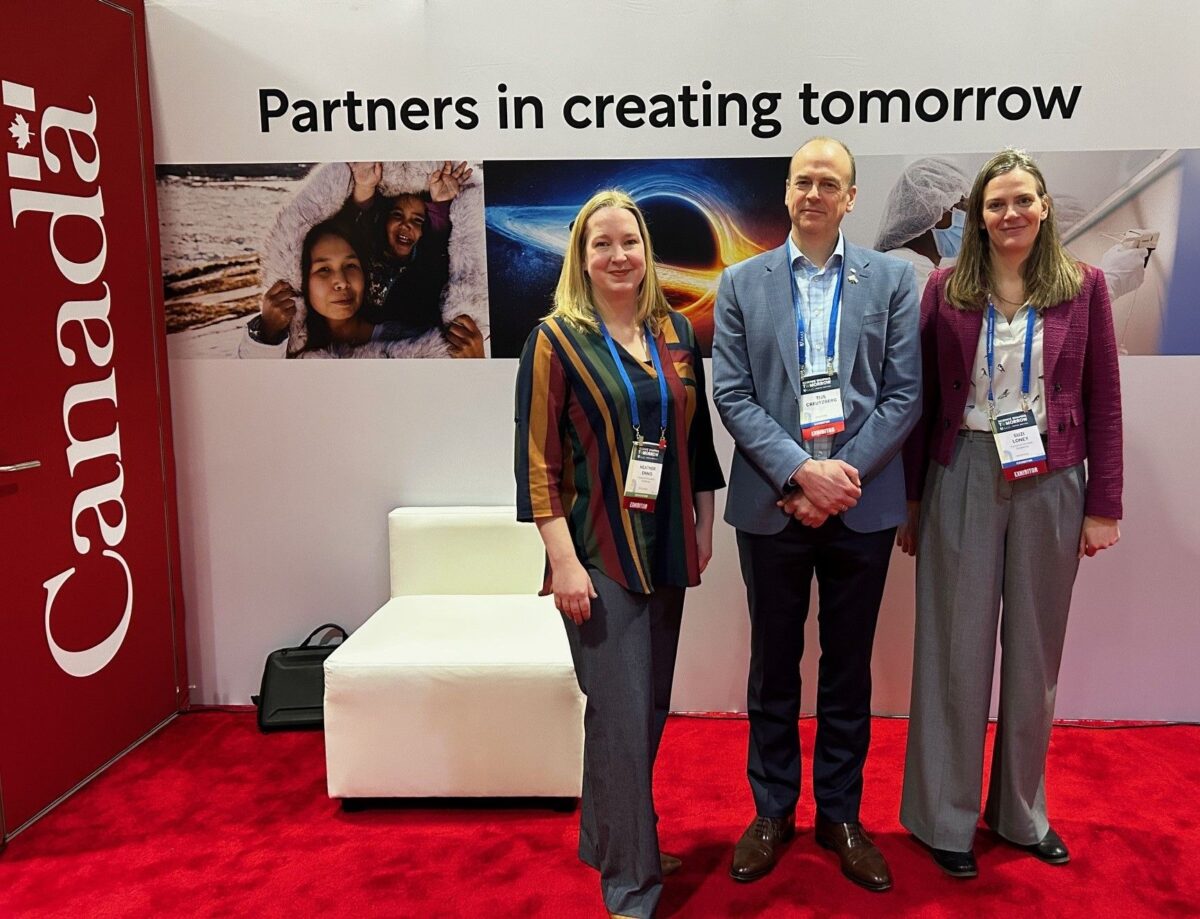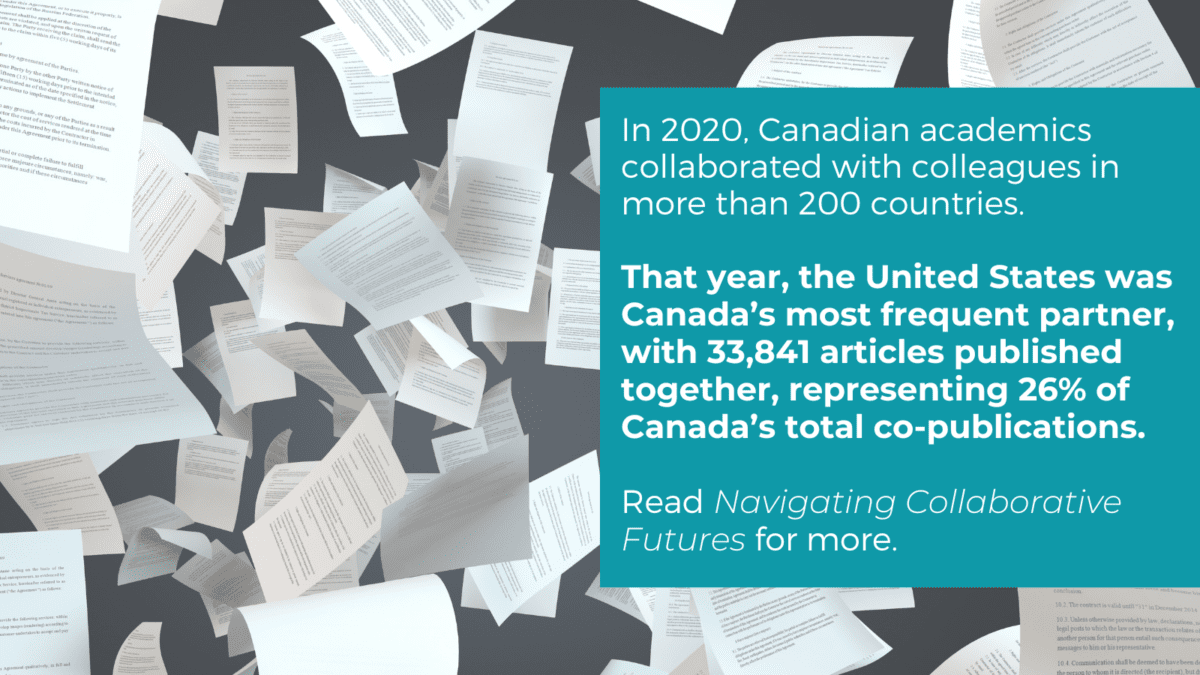
Welcome to The Advance, the newsletter of the CCA. Want to help us promote evidence-informed policy in the public interest? Feel free to forward this newsletter to a friend or colleague. If you haven’t subscribed yet, you can sign up here.
IN THIS EDITION:
- Canada’s Top Climate Change Risks, revisited
- Possible futures: Canada’s international science and tech partnerships
- Affordability and climate change; conducting research in French; misinformation and health outcomes; loyalty, entrepreneurship, and innovation; a Project Arachnid milestone; and more.
- The CCA at AAAS in Boston
- Data spotlight: Canada’s top co-author

Canada’s Top Climate Change Risks, revisited
In March 2018, the Office of the Auditor General wrote that Canada’s provincial, territorial, and federal governments were struggling to adapt to climate risks. “Most Canadian governments have not assessed and, therefore, do not fully understand what risks they face and what actions they should take to adapt to a changing climate,” auditors wrote.
One year later, responding to a question from the Treasury Board of Canada Secretariat, the CCA published Canada’s Top Climate Change Risks—a report that became a touchstone for climate adaptation research and policy, including the Government of Canada’s National Adaptation Strategy. The report “was very useful in providing an independent view of these risks to the federal adaptation community…and to help support the framing of adaptation program development,” Nick Xenos, Executive Director of the Centre for Greening Government, wrote to the CCA at the time.
Recently, the CCA revisited the impacts of Canada’s Top Climate Change Risks on the country’s climate-adaptation approach, and spoke with a number of experts about the report’s ongoing utility. The report, one leader told us, “underscored the importance of analyzing how climate events interact with and amplify each other, a perspective that has shaped much of our research.” Click here to explore our multimedia impact report for Canada’s Top Climate Change Risks.

Readings and Events
- On Thursday, February 20, Evidence for Democracy (E4D) will host a free, non-partisan discussion on the roles of the social sciences and humanities “in shaping evidence-informed policies and addressing the nation’s most pressing challenges.” The event, part of E4D’s “Safeguarding Science and Research in an Election Year,” includes in-person and virtual options.
- On Monday, February 24, the Institute for Research on Public Policy will host a free discussion on the linked challenges of affordability and climate change. “Increasing costs from extreme weather events, uncertainty about energy and supply chains and added pressure on already inadequate infrastructure and housing mean new, comprehensive solutions are needed to keep Canadians safe,” writes IRPP.
- The Canadian Science Policy Centre announced its first editorial series focused on “the role of French as a language of research in Canada,” and, specifically, “challenges and opportunities related to conducting and publishing scientific research in French in Canada.” The deadline for submissions is February 28.
- The Canadian Medical Association recently released the results of its annual health and media survey. “We’re seeing a direct link between misinformation and negative health outcomes,” the CMA reports. “Compared to last year, more Canadians report delaying medical treatment, straining personal relationships and experiencing heightened anxiety due to false health claims.” (Read Fault Lines, a report from the CCA’s Expert Panel on the Socioeconomic Impacts of Science and Health Misinformation.)
- “To boost innovation, Canada must think like a ‘big, small country’ rather than a ‘small, big country,’” Robert Atkinson wrote in a recent op-ed for the Hill Times. Atkinson, a member of the CCA’s Expert Panel on the State of Science, Technology, and Innovation in Canada, focuses his argument against techno-nationalism: “Technology companies are not maple syrup companies. They require global markets to thrive.”
- The Government of Canada recently released its “Guide to Peer Review of Automated Decision Systems,” to help promote compliance with its Directive on Automated Decision-Making. Kelly Bronson and Jason Millar, both University of Ottawa researchers and CCA expert panel alums, collaborated with the government to shape the guide.
- And Project Arachnid, a program developed by the Canadian Centre for Child Protection and launched in 2017 to remove child sex-abuse material from the internet, announced that it has taken down 50 million images. “There’s no finish line,” Jacques Marcoux, the centre’s research director, told the Winnipeg Free Press. Nonetheless, the program has been “like a life raft” for many abuse survivors.

The CCA was proud to join Team Canada at the AAAS Annual Meeting in Boston, from Feb 13-15, 2025. This gathering of global leaders in science and policy is an important opportunity to share ideas, strengthen collaborations, and explore how science and evidence can help address the world’s most pressing challenges.
